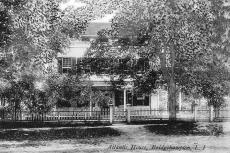The environmental review for East Hampton Town's new 22,000-square-foot senior citizen center in Amagansett will be guided by the town board, not the planning board, after a decision was reached Tuesday by the New York State Department of Environmental Conservation.
The new senior center will be located on a seven-acre parcel at 403 Abraham’s Path, adjacent to the recreation park, and will replace the current 10,100-square-foot center at 128 Springs-Fireplace Road in East Hampton.
Town Supervisor Kathee Burke-Gonzalez touted the ruling as “good news” when she gave her liaison reports at the end of Tuesday’s town board work session. She also gave a design update, saying the estimated construction cost of the facility had been reduced by about $4 million, to $28 million. The savings were made by replacing proposed stainless steel shingles with exterior walls made of fibrous cement board known as Hardie Board. Meanwhile, the roof is now proposed to be of standing-seam metal, and solar panels, originally proposed for the parking area, will be mounted on top of it instead.
In the D.E.C.’s determination, Sean Mahar, an interim commissioner for the agency, said, “The town board has the broadest governmental powers for investigation of the impacts of the action.” He got to the main contention coming from the planning board, namely
that it would be left out of the review of the center entirely if the town board adopted “a resolution declaring its immunity from planning board review based upon the ‘balancing of the public interest test,” known as the Monroe Test, after a court case, “The planning board would not have jurisdiction to review the senior center under its powers,” wrote Mr. Mahar.
“As project sponsor, the town board is best able to investigate the impacts of construction and operation of the senior center through its role as designer, its control over project financing, construction, ownership and operation of the senior center,” Mr. Mahar wrote, adding that “the town board has the greatest ability to amend its plans to avoid or reduce the projects impacts through its authority over the project.”
“Without diminishing the role of the planning board in exercising its regulatory powers over design and construction of the senior center, it does not possess the same oversight ability as the town board in this matter.”
Samuel Kramer, the chairman of the planning board, was unavailable for comment.
Mr. Mahar acknowledged that while the planning board perhaps had more experience applying the state environmental laws, the town board had been involved in the planning of the senior center for years and would work with the Planning Department and outside consultants to ensure that the State Environmental Quality Review Act laws were followed property.
“The town is pleased with the determination . . . and we appreciate their timeliness in making this decision,” Supervisor Burke-Gonzalez said in a statement issued yesterday morning. “With this determination, we can continue to move forward and make progress on this important community resource for our growing senior population.”
“This designation does not change or diminish the responsibilities or authority of the planning board or other involved agencies with jurisdiction over the project,” wrote Mr. Mahar. “The town board indicated that it intends to consult with the planning board on the development of the senior center. I encourage the town board to do so.”




